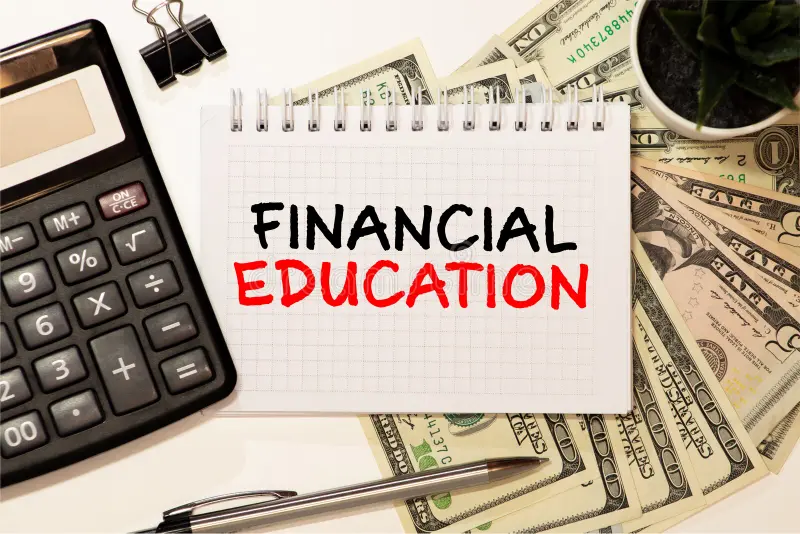Introduction to Financial Education

What is Financial Education?
Financial education is the process of acquiring the knowledge and skills necessary to make informed and effective decisions regarding your financial resources. It’s more than just knowing how to balance a checkbook or save a few dollars; it's about understanding the core principles of money management, including budgeting, saving, investing, and credit. In today's complex economic landscape, where consumer debt is at an all-time high and retirement is a growing concern, being financially literate is no longer a luxury—it’s a necessity. This article will serve as your guide to the fundamental concepts of financial education and why it's a critical skill for everyone, regardless of their age, income, or background.
Why Financial Education Matters
Financial literacy is the foundation of a stable and secure future. Without it, individuals are more likely to fall into debt, struggle to save for retirement, and make poor financial decisions that can have long-term consequences. Think of it as a life skill, similar to learning how to read or drive a car. A lack of financial education can lead to significant stress, limited opportunities, and a constant feeling of playing catch-up.
But the benefits of financial education go far beyond just avoiding problems. It empowers you to take control of your financial destiny, build wealth, and achieve your life goals, whether that's buying a home, starting a business, or simply enjoying a comfortable retirement. By understanding how money works, you can make smarter choices and create a positive cycle of financial health.
The Pillars of Financial Education
1. Budgeting and Cash Flow Management
- Defining a Budget: A budget is simply a spending plan. It helps you track your income and expenses to ensure you're not spending more than you earn.
- The 50/30/20 Rule: A popular and simple budgeting method where 50% of your income goes to needs, 30% to wants, and 20% to savings and debt repayment.
- Tools and Apps: Discuss modern tools like Mint, You Need a Budget (YNAB), or even simple spreadsheets to help manage cash flow.
2. Savings and Emergency Funds
- Why Saving is Crucial: Explain the importance of saving for short-term goals (vacation, car down payment) and long-term goals (retirement, college fund).
- The Emergency Fund: Define an emergency fund and recommend a target amount (e.g., 3-6 months of living expenses). Emphasize that this fund is for unexpected events only, like job loss or medical emergencies.
3. Understanding Credit and Debt
- What is a Credit Score?: Break down what a credit score is, why it's important (for loans, mortgages, etc.), and the factors that influence it (payment history, credit utilization).
- Good Debt vs. Bad Debt: Differentiate between productive debt (e.g., a mortgage or student loan that can increase your future earning potential) and unproductive debt (e.g., high-interest credit card debt).
- Managing Debt: Provide strategies for paying down debt, such as the snowball method (paying off the smallest debts first) or the avalanche method (paying off the highest-interest debts first).
4. Investing for the Future
- The Power of Compound Interest: Explain this fundamental concept in a simple way, showing how your money can grow over time. Use an example to illustrate.
- Investment Basics: Introduce different types of investments, such as stocks, bonds, and mutual funds.
- Risk and Diversification: Explain the relationship between risk and return and why diversifying your investments across different asset classes is essential to mitigate risk.
5. Retirement Planning
- Start Early: Emphasize that the earlier you start, the less you have to save due to the power of compounding.
- Retirement Accounts: Briefly introduce common retirement vehicles like a 401(k), IRA, or other country-specific equivalents.
- Setting Goals: Encourage readers to set a clear retirement goal and work backward to determine how much they need to save annually.
The Role of Financial Education in Everyday Life
- For Young Adults: How financial education can help with student loans, first jobs, and establishing good habits early.
- For Families: Discuss how it impacts household decisions, managing bills, and teaching children about money.
- For Entrepreneurs and Business Owners: How financial literacy is crucial for managing business finances, securing funding, and ensuring profitability.
How to Get Started with Financial Education
- Read Books and Blogs: Recommend a few popular and accessible books or financial blogs.
- Take Online Courses: Point to free resources from universities or financial institutions.
- Use Financial Tools: Reiterate the use of budgeting apps and other digital tools.
- Talk to a Financial Advisor: Suggest that for complex situations, consulting a professional can be beneficial.
Conclusion
Financial education is a lifelong journey, not a destination. It's about building a foundation of knowledge and skills that will serve you throughout your life. By understanding the core principles of budgeting, saving, credit, and investing, you can take control of your financial life, reduce stress, and build a more secure and prosperous future. Start your journey today—your future self will thank you.

Related